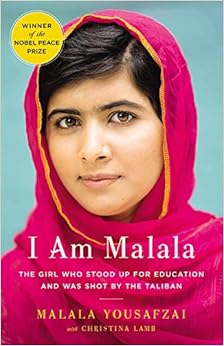I read this book as it was in the book club on the SheLoves Magazine website. I want to write my review before I read the discussion post today but I'm not sure how quickly I'll get this up.
I'm not sure what I was expecting in this book, but I got something completely different. The book begins with a potted history of the nation of Pakistan, then provides some context in the form of Malala's Father's story. It slipped seamlessly into Malala's story without my really noticing. The story itself is a fascinating insight into everyday life in an area ruled by the taliban. If you've ever wondered how cities can be "Taken by the Taliban" or "reclaimed by the army"; or how people live when there is daily fighting in the streets, this book will provide you with at least one perspective.
This book struck me as I started reading it in the week that the Chilcott enquiry was published. This was an enquiry into the UK's role in the Iraq war, and was not complimentary about the decisions made or the processes by which they were reached! To read about the direct impact this had on a rural valley in Pakistan was eye-opening, and the impact that continues is alarming.
I enjoyed that Malala's portrayal of herself is so much more human than those in the media. She was a normal teenage girl, who fought with her best friend and wouldn't share with her brothers. She is so outspoken because she follows the footsteps of her father. She came from the back of beyond but almost without realising became a person of such significance that the foreign hospital she was taken to and the people who took her there were of diplomatic significance. In fact, her survival was of diplomatic significance. It's a real example of how small steps, decisions made every day, can snowball into something that effects a real change in the world.
It's a raw book. I don't think it can have been written very long after the family resettled in Birmingham. My copy is a newer edition and there is a new interview with Malala at the back. There is a clear contrast between Malala's description of life in the UK in the final chapter of the book vs the interview, and I'm pleased the family seem to be slowly settling though their hearts are clearly still back home.
In summary I would whole-heartedly recommend this book if you have an interest in political history; an interest in women's rights; or you just like a good autobiography. It may not be the greatest literary classic but if you try you can hear Malala's Pakistani accent in the turns of phrase.
Right, let's see what everyone else thought. The discussion page is here.

No comments:
Post a Comment